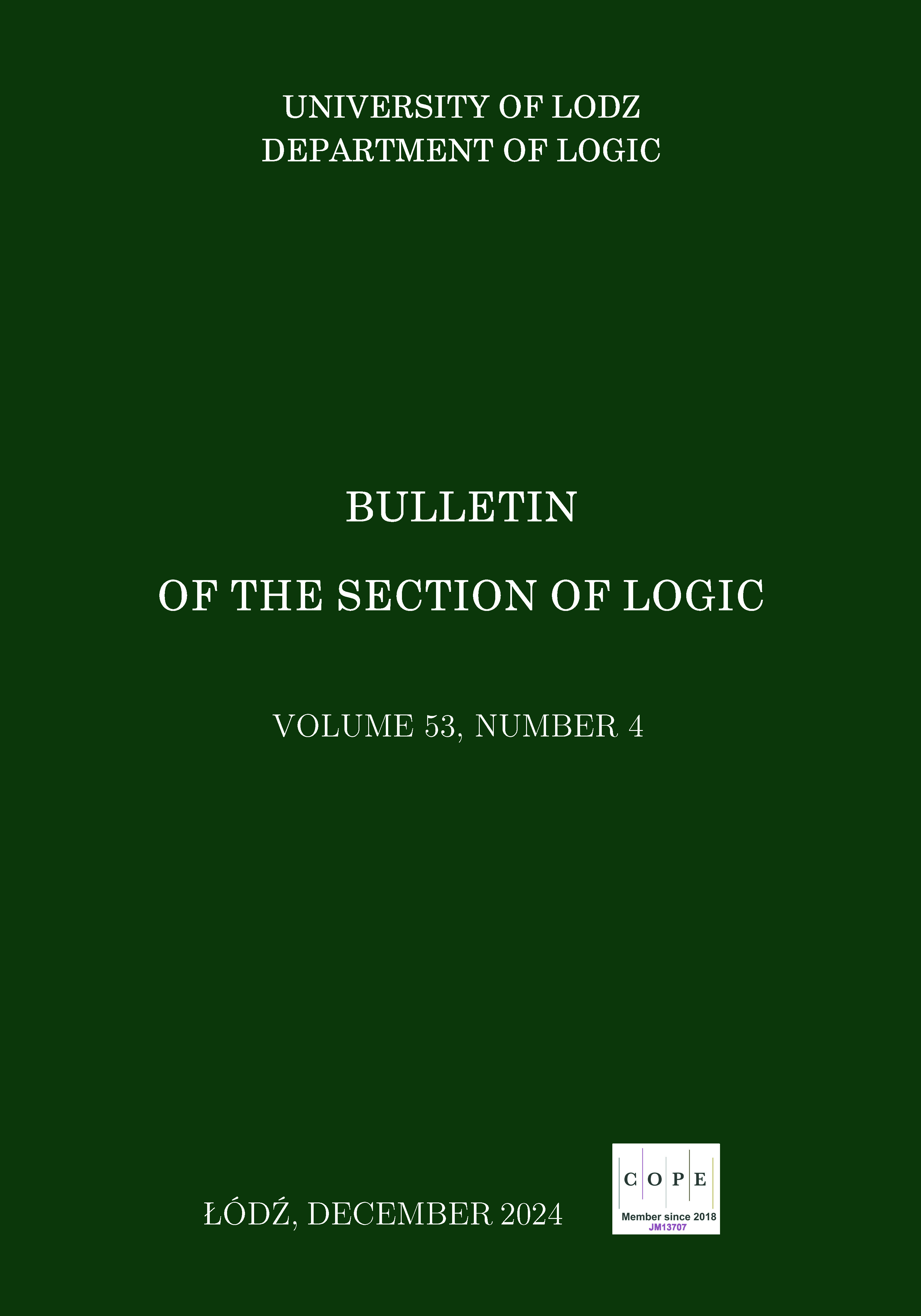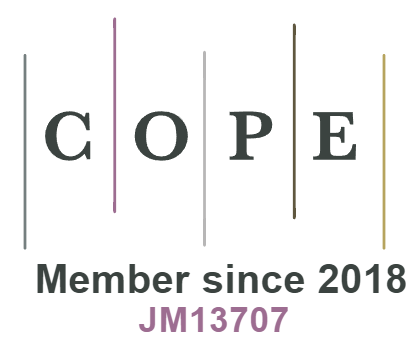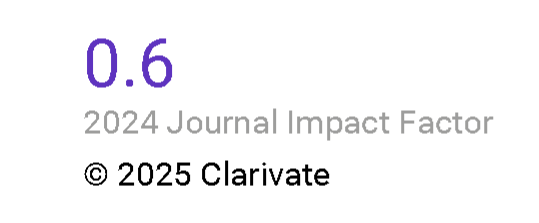Exploring the Definition of Non-Monotonicity – Logical and Psychological Considerations
DOI:
https://doi.org/10.18778/0138-0680.2024.14Keywords:
non-monotonicity, reasoning, belief revisionAbstract
When humans reason, they are able to revise their beliefs in light of new information and abandon obsolete conclusions. Logicians argued, that in some cases, such reasonings appear to be non-monotonic. Thus, many different, seemingly non-monotonic systems were created to formally model such cases. The purpose of this article is to re-examine the definition of non-monotonicity and its implementation in non-monotonic logics and in examples of everyday human reasoning. We will argue that many non-monotonic logics employ some weakened versions of the definitions of non-monotonicity, since in-between different steps of reasoning they either: a) allow previously accepted premises to be removed, or b) change the rules of inference. Of the two strategies, the second one seems downright absurd, since changing the rules of a given logic is a mere replacement of that logic with the rules of another. As a consequence we obtain two logics, whereas the definition of a non-monotonic logic is supposed to define one. The definition of non-monotonicity does not permit either of these cases, which means that such logics are monotonic.
References
D. Batens, A general characterization of adaptive logics, Logique et Analyse, vol. 44(173/175) (2001), pp. 45–68.
Google Scholar
D. Batens, A universal logic approach to adaptive logics, Logica Universalis, vol. 1(1) (2007), pp. 221–242, DOI: https://doi.org/10.1007/s11787-006-0012-5
Google Scholar
DOI: https://doi.org/10.1007/s11787-006-0012-5
D. Batens, The need for adaptive logics in epistemology, [in:] S. Rahman, J. Symons, D. M. Gabbay, J. P. van Bendegem (eds.), Logic, Epistemology, and the Unity of Science, Springer, Dordrecht (2009), pp. 459–485, DOI: https://doi.org/10.1007/978-1-4020-2808-3
Google Scholar
DOI: https://doi.org/10.1007/978-1-4020-2808-3_22
A. T. Beck, D. A. Clark, Anxiety and depression: An information processing perspective, Anxiety Research, vol. 1(1) (1988), pp. 23–36, DOI: https://doi.org/10.1080/10615808808248218
Google Scholar
DOI: https://doi.org/10.1080/10615808808248218
J. M. Bocheński, S. Judycki, Współczesne metody myślenia (Contemporary ways of thinking), W drodze, Poznań (1992).
Google Scholar
C. F. Chick, V. F. Reyna, J. C. Corbin, Framing effects are robust to linguistic disambiguation: A critical test of contemporary theory, Journal of Experimental Psychology: Learning, Memory, and Cognition, vol. 42(2) (2016), p. 238, DOI: https://doi.org/10.1037/xlm0000158
Google Scholar
DOI: https://doi.org/10.1037/xlm0000158
A. M. Colman, A Dictionary of Psychology, Oxford University Press (2016).
Google Scholar
N. R. Da Silva, J. F. Bonnefon, E. Raufaste, An empirical test of patterns for nonmonotonic inference, Annals of Mathematics and Artificial Intelligence, vol. 34(1) (2002), pp. 107–130, DOI: https://doi.org/10.1023/A:1014473706150
Google Scholar
DOI: https://doi.org/10.1023/A:1014473706150
T. De Haan, R. Van Veldhuizen, Willpower depletion and framing effects, Journal of Economic Behavior & Organization, vol. 117 (2015), pp. 47–61, DOI: https://doi.org/10.1016/j.jebo.2015.06.002
Google Scholar
DOI: https://doi.org/10.1016/j.jebo.2015.06.002
D. J. Dozois, A. T. Beck, Cognitive schemas, beliefs and assumptions, [in:] K. S. Dobson, D. J. A. Dozois (eds.), Risk Factors in Depression, Elsevier Academic Press (2008), pp. 119–143.
Google Scholar
DOI: https://doi.org/10.1016/B978-0-08-045078-0.00006-X
D. M. Gabbay, Intuitionistic basis for non-monotonic logic, [in:] D. W. Loveland (ed.), 6th Conference on Automated Deduction. CADE 1982, vol. 138 of Lecture Notes in Computer Science, Springer, Berlin, Heidelberg (1982), pp. 260-273, DOI: https://doi.org/10.1007/BFb0000064
Google Scholar
DOI: https://doi.org/10.1007/BFb0000064
A. Gilio, Probabilistic reasoning under coherence in System P, Annals of Mathematics and Artificial Intelligence, vol. 34(1) (2002), pp. 5–34, DOI: https://doi.org/10.1023/A:1014422615720
Google Scholar
DOI: https://doi.org/10.1023/A:1014422615720
K. J. Holyoak, Analogy and relational reasoning, [in:] K. J. Holyoak, R. G. Morrison (eds.), The Oxford Handbook of Thinking and Reasoning, Oxford University Press, New York (2012), pp. 234–259.
Google Scholar
DOI: https://doi.org/10.1093/oxfordhb/9780199734689.013.0013
P. N. Johnson-Laird, Mental models and human reasoning, Proceedings of the National Academy of Sciences, vol. 107(43) (2010), pp. 18243–18250, DOI: https://doi.org/10.1073/pnas.1012933107
Google Scholar
DOI: https://doi.org/10.1073/pnas.1012933107
S. Kraus, D. Lehmann, M. Magidor, Nonmonotonic reasoning, preferential models and cumulative logics, Artificial Intelligence, vol. 44(1–2) (1990), pp. 167–207, DOI: https://doi.org/10.1016/0004-3702(90)90101-5
Google Scholar
DOI: https://doi.org/10.1016/0004-3702(90)90101-5
G. Kuhnmünch, M. Ragni, A Formal Non-monotonic Systems Properly Describe Human Reasoning?, [in:] Proceedings of the Annual Meeting of the Cognitive Science Society, vol. 36 (2008), pp. 1222–1227.
Google Scholar
S. Lerner, A non-monotonic intensional framework for framing effects, Journal of Economic Methodology, vol. 21(1) (2014), pp. 37–53, DOI: https://doi.org/10.1080/1350178X.2014.886469
Google Scholar
DOI: https://doi.org/10.1080/1350178X.2014.886469
J. Łukasiewicz, O nauce (About science), [in:] Poradnik dla Samoukow. Wskazowki metodyczne dla studiujacych poszczegolne nauki (Handbook for the self-taught. Methodical tips for those who study science), vol. 1, Wydaw. A. Heflicha i St. Michalskiego (1915), pp. 15–39.
Google Scholar
P. Łukowski, Is human reasoning really nonmonotonic?, Logic and Logical Philosophy, vol. 22 (2013), pp. 63–73, DOI: https://doi.org/10.12775/LLP.2013.004
Google Scholar
DOI: https://doi.org/10.12775/LLP.2013.004
P. Łukowski, Logical problems with nonmonotonicity, Logic and Logical Philosophy, vol. 23(2) (2014), pp. 171–188, DOI: https://doi.org/10.12775/LLP.2014.004
Google Scholar
DOI: https://doi.org/10.12775/LLP.2014.004
P. Łukowski, Logika praktyczna z elementami wiedzy o manipulacji, Wolters Kluwer (2021).
Google Scholar
F. Macagno, The logical and pragmatic structure of arguments from analogy, Logique et Analyse, vol. 240 (2017), pp. 465–490, DOI: https://doi.org/10.2143/LEA.240.0.3254093
Google Scholar
D. Makinson, Bridges between classical and nonmonotonic logic, Logic Journal of IGPL, vol. 11(1) (2003), pp. 69–96, DOI: https://doi.org/10.1093/jigpal/11.1.69
Google Scholar
DOI: https://doi.org/10.1093/jigpal/11.1.69
D. Makinson, Sets, logic and maths for computing, Heidelberg, Berlin: Springer, Cambridge (2008), DOI: https://doi.org/10.1007/978-3-030-42218-9
Google Scholar
DOI: https://doi.org/10.1007/978-1-84628-845-6
J. Marcos, What is a non-truth-functional logic?, Studia Logica, vol. 92(2) (2009), pp. 215–240, DOI: https://doi.org/10.1007/s11225-009-9196-z
Google Scholar
DOI: https://doi.org/10.1007/s11225-009-9196-z
M. Oaksford, N. Chater, Bayesian Rationality: The Probabilistic Approach to Human Reasoning, Oxford University Press (2007).
Google Scholar
DOI: https://doi.org/10.1093/acprof:oso/9780198524496.001.0001
H. Okder, The illusion of the framing effect in risky decision making, Journal of Behavioral Decision Making, vol. 25(1) (2012), pp. 63–73, DOI: https://doi.org/10.1002/bdm.715
Google Scholar
DOI: https://doi.org/10.1002/bdm.715
N. Pfeifer, Psychological investigations on human nonmonotonic reasoning with a focus on System P and the conjunction fallacy, Master’s thesis, Institut für Psychologie, Universität Salzburg, Salzburg (2002).
Google Scholar
N. Pfeifer, I. Douven, Formal epistemology and the new paradigm psychology of reasoning, Review of Philosophy and Psychology, vol. 5(2) (2014), pp. 199–221, DOI: https://doi.org/10.1007/s13164-013-0165-0
Google Scholar
DOI: https://doi.org/10.1007/s13164-013-0165-0
N. Pfeifer, G. D. Kleiter, Coherence and nonmonotonicity in human reasoning, Synthese, vol. 146(1) (2005), pp. 93–109, DOI: https://doi.org/10.1007/s11229-005-9073-x
Google Scholar
DOI: https://doi.org/10.1007/s11229-005-9073-x
R. Reiter, A Logic for Default Reasoning, Artificial Intelligence, vol. 13 (1980), pp. 81–132, DOI: https://doi.org/10.1016/0004-3702(80)90014-4
Google Scholar
DOI: https://doi.org/10.1016/0004-3702(80)90014-4
N. Rescher, Introduction to Value Theory, University Press of America (1969).
Google Scholar
K. Rudnicki, The psychological aspects of paraconsistency, Synthese, vol. 199 (2021), pp. 4393–4414, DOI: https://doi.org/10.1007/s11229-020-02983-8
Google Scholar
DOI: https://doi.org/10.1007/s11229-020-02983-8
N. B. Schmidt, K. L. Schmidt, J. E. Young, Schematic and interpersonal conceptualizations of depression: An integration, [in:] T. Joiner, J. C. Coyne (eds.), The Interactional Nature of Depression, American Psychological Association, Washington, DC (1999), pp. 127–148, DOI: https://doi.org/10.1037/10311-000
Google Scholar
DOI: https://doi.org/10.1037/10311-005
B. Sobociński, Kazimierz Ajdukiewicz. Klasyfikacja rozumowań (Classification of reasonings), The Journal of Symbolic Logic, vol. 21(3) (1956), pp. 311–312, DOI: https://doi.org/10.2307/2269111
Google Scholar
DOI: https://doi.org/10.2307/2269111
Steiger, A. Kühberger, A meta-analytic re-appraisal of the framing effect, Zeitschrift für Psychologie, vol. 226(1) (2018), p. 45, DOI: https://doi.org/10.1027/2151-2604/a000321
Google Scholar
DOI: https://doi.org/10.1027/2151-2604/a000321
K. Stenning, M. van Lambalgen, Interpretation, representation, and deductive reasoning, [in:] J. E. Adler, L. J. Rips (eds.), Reasoning: Studies of human inference and its foundations, Cambridge University Press (2019), pp. 223–248.
Google Scholar
DOI: https://doi.org/10.1017/CBO9780511814273.013
F. Toates, A model of the hierarchy of behaviour, cognition, and consciousness, Consciousness and Cognition, vol. 15(1) (2006), pp. 75–118, DOI: https://doi.org/10.1016/j.concog.2005.04.008
Google Scholar
DOI: https://doi.org/10.1016/j.concog.2005.04.008
A. Tversky, D. Kahneman, The framing of decisions and the psychology of choice, Science, vol. 211(4481) (1981), pp. 453–458, DOI: https://doi.org/10.1126/science.74556
Google Scholar
DOI: https://doi.org/10.1126/science.7455683
D. N. Walton, What is reasoning? What is an argument?, The Journal of Philosophy, vol. 87(8) (1990), pp. 399–419, DOI: https://doi.org/10.2307/2026735
Google Scholar
DOI: https://doi.org/10.2307/2026735
H. Wansing, Semantics-based nonmonotonic inference, Notre Dame Journal of Formal Logic, vol. 36(1) (1995), pp. 44–54, DOI: https://doi.org/10.1305/ndjfl/1040308828
Google Scholar
DOI: https://doi.org/10.1305/ndjfl/1040308828
M. Werning, S. Cheng, Taxonomy and unity of memory, [in:] S. Bernecker, K. Michaelian (eds.), The Routledge Handbook of Philosophy of Memory, Routledge (2017), pp. 7–20, DOI: https://doi.org/10.4324/9781315687315
Google Scholar
DOI: https://doi.org/10.4324/9781315687315-2
P. B. Williams, H. C. Nusbaum, Toward a neuroscience of wisdom, [in:] J. R. Absher, J. Cloutier (eds.), Neuroimaging Personality, Social Cognition, and Character, Academic Press (2016), pp. 383–395, DOI: https://doi.org/10.1016/C2013-0-18623-0
Google Scholar
DOI: https://doi.org/10.1016/B978-0-12-800935-2.00021-X
J. T. Wixted, S. L. Thompson-Schill, Stevens’ Handbook of Experimental Psychology and Cognitive Neuroscience, Language and Thought, vol. 3, John Wiley & Sons (2018), DOI: https://doi.org/10.1002/9781119170174
Google Scholar
DOI: https://doi.org/10.1002/9781119170174
L. A. Zadeh, Fuzzy logic, Computer, vol. 21(4) (1988), pp. 83–93, DOI: https://doi.org/10.1109/2.53
Google Scholar
DOI: https://doi.org/10.1109/2.53
Downloads
Published
How to Cite
Issue
Section
License

This work is licensed under a Creative Commons Attribution-NonCommercial-NoDerivatives 4.0 International License.















